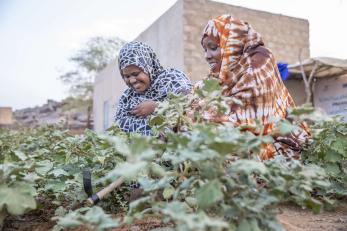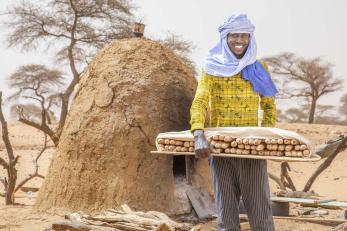Mauritania

Mercy Corps has worked in Mauritania since 2022, primarily focused on promoting food security, economic resilience, civic engagement, and social connection for communities throughout the country.
The context
Mauritania is a country of more than 4.7 million people, and those under the age of 35 make up over 70% of Mauritania’s population. The future of the country is overwhelmingly young, with a median age of 21. Many people in Mauritania lack access to gather and grow the assets they need to create a stable, sustainable future for themselves and their communities.
More than half of the population’s income derives from agriculture and livestock, but the production is not enough to feed their communities. A majority of Mauritania’s goods, like wheat, palm oil, and sugar, are imported from other countries. The war in Ukraine has impacted fuel prices, which then increases the prices of staples like bread. While the government subsidizes some of the costs, price inflation is especially difficult for people who already face challenges to meet basic cost of living outside of urban centers.
Many communities both within and bordering the country have been displaced by droughts, flooding, and conflict near the southeastern borders with Mali. According to the U.N., 84% of refugees and asylum seekers in the country live at the Mbera Refugee Camp. Mbera often lacks access to basic necessities and services, pushing refugees towards urban centers. Lack of access and scarce resources are exacerbated by the country’s long history of inter-ethnic division. Gangs and armed opposition groups operate across the country, and recruit young people who are economically disadvantaged or food insecure. As part of a national strategy to end violent activity, local youth-serving organizations are working to disrupt all the mechanisms—lack of access to health services and safety, lack of economic opportunities, lack of social connection—that would encourage a young person to join an extremist organization.
Our impact
Mercy Corps partners with local organizations to promote cooperation across identity groups, with a particular focus on young people. Through the Nafooré program, which means “added value” in Fulani, youth participants work within their communities to build a brighter future for all Mauritanians. Our activities help us make an impact across the areas below:
Promoting access to health and nutrition at home
Mercy Corps supports a youth-led steering committee that selects local organizations who share their goals to partner with them on projects. The program partners helped to relieve the cost of necessities and services like health education and nutrition support, primarily for women participants. Through the program, partners distributed hygiene kits to more than 1,000 young women and girls, alongside menstrual health education. Reducing the financial burden of purchasing hygiene products is more important in women-led households, which typically bring in lower incomes. By providing training on how to track menstrual cycles and the importance of good hygiene, people who menstruate are better equipped to care for their overall health.

By collaborating with partner organizations, Mercy Corps has provided community meals that reached more than 2,000 people, delivered emergency food kits to 3,000 participants, and shared information on food security and nutrition. Many of the community meals also included discussions on local governance and how women can play a role in peace and security in Mauritania. Acute malnutrition disproportionately impacts women and children. Between harvests, when reserves are low, up to 18.5% of the population is food insecure, according to the World Food Program. Mercy Corps introduced sustainable agriculture practices and management techniques to alleviate the impacts of climate change for farmers and pastoralists. Support for more than 300 farmers and 27 agricultural cooperatives helped to boost more consistent yields that can be preserved and saved for the lean season.
Increasing economic opportunities by supporting small businesses
Through apprenticeships, mentoring, training for technical and vocational skills, and financial aid, young business owners are growing and sustaining their assets and income. Since 2023, almost 100 youth entrepreneurs have created small businesses, and local youth associations have been trained to provide support to them. Through vocational training, youth have an easier path to join the labor market and contribute to the economic development of their communities.

Mercy Corps also provides unconditional cash grants to the heads of households made up of six or more people to increase economic resilience, reaching more than 5,500 people. Alleviating the pressure of financial and systemic barriers will help people to seek out or continue employment.
Supporting connections among community members
Mercy Corps promotes safe locations for community members to meet, where they are paired with mentors from their communities, connect with like-minded individuals, and strengthen their social lives. Many young women often have more domestic responsibilities, and are not able to take the time to pursue hobbies, education, or employment outside of their homes. The program creates spaces for personal development and mentorship that fits within their day-to-day lives. It builds community and connection by addressing instability in people’s lives. Participants receive training in conflict resolution techniques and enhance their participation in peacebuilding. These connections create a sense of agency in their own individual lives and ownership for a more peaceful future in Mauritania.